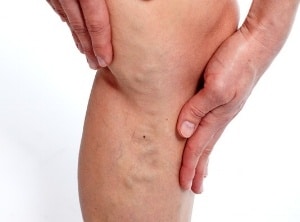
How to Treat Bleeding Varicose Vein and Bleeding Spider Veins
What can you do to treat bleeding varicose vein and spider veins?
First and foremost, don’t panic. Although the visual effect of a ruptured varicose vein or bleeding vein can be alarming, there are some simple things that can be done to get the bleeding to stop.
If you can reach the area that is bleeding, grab a tissue, wash cloth, towel, or whatever is handy and apply firm pressure. Hold the pressure for at least five minutes before “checking” to see if it has stopped. If you cannot reach the area, ask a family member, neighbor, or friend for help. Again, these bleeding veins look alarming but it would literally take several hours to “bleed to death” from a varicose vein rupture.
In addition to applying pressure, elevate the leg. If you don’t want to risk bleeding on the couch, bed, floor, throw a plastic bag underneath the area that is bleeding to protect fabric. A cold compress (ice, frozen peas, etc.) near the area that is bleeding will cause the blood vessels to constrict and help stop the bleeding. Finally, breathe. Slow deep breathing will help lower your blood pressure and heart rate which will help slow the bleeding.
Get a Full Vein Screening
It is important to have a lower extremity vascular evaluation. Bleeding veins can be a symptom of a larger vascular issue. There are vein treatment options which can eliminate bleeding varicosities, underlying venous problems, and the symptoms associated with them. Contact our vein specialist to schedule a complete venous evaluation and discuss appropriate treatment options.
After Bleeding Stops
One way to get blood out of clothing is to saturate the area in hydrogen peroxide. If you don’t have hydrogen peroxide handy, rinse the article in cold water and leave it damp until you can use the peroxide.
Congratulations, you are pregnant! Your bundle or bundles of joy are on the way to change your life forever! The body changes quickly during pregnancy, and some of these changes are not so wonderful! Varicose veins are a common occurrence in pregnancy. There are a number of reasons for this: blood volume increases, hormones shift,…
Read More- « Previous
- 1
- …
- 13
- 14
- 15

